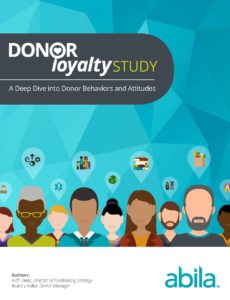A recent article by Michael J. Rosen explores why donors give, according to the results of a survey conducted by Abila, a provider of services and software for non-profits. Donors are obviously important to non-profit organizations, but a disconnect can exist between how donors actually interact with the organizations that they support and how said organizations think they interact. Abila studied the results of their survey and came up with with an in-depth look into non-profit marketing, from content “do’s and don’ts,” to communication preferences, and generational donor trends.
“Marketing is about numbers, research, and statistics. But that’s not
enough by itself. Marketing, like development, is an art — it involves
understanding human motivations. Those motivations determine how,
when, what and why donors give.” –Fund Raising Matters, Issue 56
Rosen pushes for a greater understanding of the donors who are giving to your organization, “Giving is about them (the donors and what motivates them) and is far less about you and your nonprofit organization.” Researching and listening to your constituency, as we advocate in Issue 56 of Fund Raising Matters, can make sure the money you are spending to get your message out there is reaching the right people, and that it aligns with their preferences.
Donors Say: Enough about You. Let’s Talk about Me!
Written by Michael J. Rosen
A recent study reveals that donors support charitable causes for “very personal reasons.” In other words, giving is about them (the donors and what motivates them) and is far less about you and your nonprofit organization.
This is not surprising news to those of us who practice donor-centered fundraising. Nevertheless, it’s nice to have additional research data that supports the idea of being donor centered.

Donor Loyalty Study: A Deep Dive Into Donor Behavior and Attitudes is the study report from Abila, a leading provider of software and services to nonprofit organizations. The researchers explored questions with a representative sample of 1,136 donors in the United States across all age segments who made at least one donation to a nonprofit organization within the previous 12 months.
The study identifies the three “main reasons for donating”:
- I am passionate about the cause — 59 percent
- I know that the organization I care about depends on me — 45 percent
- I know someone affected by their cause — 33 percent
Other reasons for donating generated far lower responses, ranging from just three to 18 percent.
You’ll notice that each of the top three reasons for giving involve “I” not necessarily you or your charity. Let’s explore this a bit.
The number-one reason for giving involves the donor’s passion. You’ll also notice that the donor is passionate about and supports the “cause” though not necessarily the organization.
In other words, I may be passionate about fighting cancer. However, I might be fickle when it comes to supporting a particular cancer charity. For example, this year, I might support the American Cancer Society. However, if I’m not stewarded or asked effectively, I might shift my support to the City of Hope next year. I’ll still be a passionate supporter of the fight against cancer, but the organization I choose to support will change.
The challenge for nonprofit organizations is to embody the cause for which donors have passion. An organization needs to demonstrate to its donors that it is the worthy channel for their passion. Remember, donors have choices. You need them more than they need you.
If you do what I’ve just said, donors will understand that you need them, that you “depend” on them. And that’s the second most common reason why people give. If your organization embodies a donor’s passion and let’s that donor know how important she is, she will be far more likely to renew and upgrade her support.
The third reason for giving is really just a sub-category of the first. Again, it’s about the “cause” rather than the organization. Yes, in some cases, it might be about your specific organization. However, that won’t always be the case.
By understanding your donors, you can tailor stewardship and appeal messages to them. This will improve your effectiveness.
Understanding what motivates your donors is not the sum total of what it means to be donor centered. However, it’s an essential component.
By contrast, consider this: Many charities pride themselves, rightly or wrongly, on their social media strategy. However, just eight percent of survey respondents said they were inspired to give because they “saw a post on social media.” I’m not suggesting that social media can’t be a powerful tool. I’m just saying that if you want to touch someone, you need to understand his or her motivations and passions. Once you know those things, you can leverage that understanding to create a truly effective communication strategy.
So, how can you learn about the passions and motivations of your donors? Simple. Do what Abila did. Ask them!
That’s what Michael Rosen says… What do you say?
